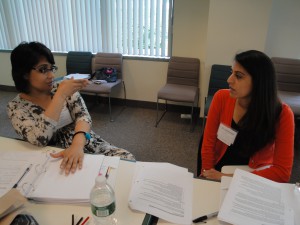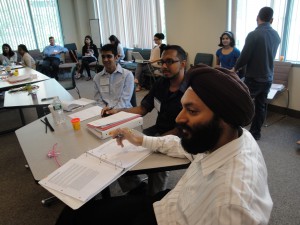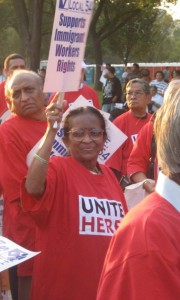View FAQ here.
1. How does We Build Community work?

We Build Community will provide sub-grants to five (5) NCSO members of $10,000 each and trainings in order to strengthen their ability to engage more deeply in programs, partnerships, organizing, advocacy and mobilization related to effective coalition building and alliances around racial justice, immigration justice, gender justice, and/or LGBTQ justice. We especially encourage organizations that work with LGBTIQ communities, or organizations that seek to work more closely with LGBTIQ communities to apply and to articulate your vision and plan for coalition-building.
2. Why is capacity and infrastructure building the focus of We Build Community?
Since the founding of the NCSO in 2007, NCSO members have convened at two National South Asian Summits to share insights about challenges and identify needed resources. Time and again, capacity building has emerged as the key obstacle to meeting organizational goals. SAALT heard this need, developed We Build Community to help address this gap, and sought funding support from the Ford Foundation; Open Society Foundation’s National Security and Human Rights Campaign Equality and Opportunity Fund; and Atlantic Philanthropies, all national foundations who are interested in infrastructure and field-building among immigrant communities
Through We Build Community, organizations can direct the sub-grants they receive towards training, technical assistance, consultants, and planning related to areas such as: resource development; human resources; board development and management; member/volunteer management and supervision; program documentation, evaluation, and reporting systems; effective fiscal management; and development and maintenance of technology.
3. What do We Build Community trainings look like?
- SAALT provides training and support
 to the We Build Community cohorts in a variety of ways. This multi-pronged approach is designed to offer a fuller spectrum of support for capacity-building needs.
to the We Build Community cohorts in a variety of ways. This multi-pronged approach is designed to offer a fuller spectrum of support for capacity-building needs. - One-on-one quarterly calls with each cohort member to provide ongoing technical assistance and support around programmatic work and organizational capacity-building needs; identify new opportunities for technical assistance and support; and ensure bidirectional avenues of communication are maintained for an efficient and effective collaborative process.
- Technical assistance for cohort members around developing We Build Community work plans, monitoring and evaluation processes, and sub-grant agreements.
- Quarterly NCSO webinars addressing topics such as financial literacy, civil and political engagement, and other organizational capacity-building and programmatic areas.
- Two-day cohort convening in Washington, DC on March 21–23, 2014 to provide in-depth individual and organizational skills training on consistently identified topics of need, such as board development, grant writing, and communications and how these skills can be used to strengthen work around racial justice, immigration, and/or national security. Trainings facilitated by SAALT staff, consultants, and other experts. The convening also provides a space for robust peer learning and exchange.
4. Why is We Build Community focusing on racial justice, immigration justice, gender justice, and/or LGBTQ justice through effective coalition building and allyship?
Two key issues compound the problems facing South Asian communities in our country today: first, the ongoing discrimination and hate violence that community members face, which are compounded by multiple layers of identity (gender, sexual orientation, immigration status, and religious affiliation); and second, the lack of infrastructure and capacity of South Asian organizations to address these issues.
South Asians occupy a unique racial space in the United States. The “model minority  myth” perpetuates the perception that our communities have new needs or concerns—masking tremendous disparities in terms of poverty and income levels, educational attainment, and language barriers facing community members—and creates an environment of racial bias towards South Asian Americans. September 11, 2001 was a pivotal moment for South Asian in the US, resulting in a significant and more visible shift away from the assumption of model minority toward racial target. In a post‑9/11 environment, South Asian Americans have suffered unprecedented backlash, including hate crimes, profiling, employment discrimination, bias-based bullying, and other forms of harassment.
myth” perpetuates the perception that our communities have new needs or concerns—masking tremendous disparities in terms of poverty and income levels, educational attainment, and language barriers facing community members—and creates an environment of racial bias towards South Asian Americans. September 11, 2001 was a pivotal moment for South Asian in the US, resulting in a significant and more visible shift away from the assumption of model minority toward racial target. In a post‑9/11 environment, South Asian Americans have suffered unprecedented backlash, including hate crimes, profiling, employment discrimination, bias-based bullying, and other forms of harassment.
For many South Asians, racial injustice is underscored by the confluence of additional characteristics, such as religious faith, gender, immigration status, or sexual orientation. Nearly three-quarters of the South Asian community is foreign-born, and a growing number of South Asians are undocumented. As a result, anti-immigrant sentiment and immigration enforcement measures have serious impact on South Asian communities. Furthermore, many South Asians have long endured hate violence and discrimination due to their sexual orientation, gender identity and gender expression. These multiple layers of discrimination and oppression make it difficult for South Asians to exercise a range of rights – from reporting hate crimes to accessing services and care to reaching out to their own communities for support.
Through We Build Community, we hope that NCSO organizations with an interest in engaging more deeply around racial justice, immigration justice, gender justice, and/or LGBTQ justice through effective coalition building and allyship will be able to do so in order to bring more diverse and inclusive community voices and issues—reflective of the complex and interdependent intersections of identities in our communities—to the forefront.
5. Who is eligible to apply for We Build Community?
Application to We Build Community is open to current NCSO members who have 501c3 status or a fiscal sponsor.
6. What is the deadline for applying to We Build Community?
Interested applicants should submit applications no later than October 14, 2013. Proposals may be submitted as single PDF documentby email to kai@saalt.org with the subject line “We Build Community 2013–2014 Application.” Download application here.
The call for applications for We Build Community 2013–2014 is now closed.